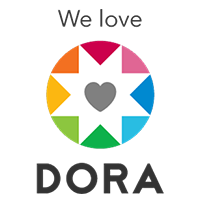As 2018 comes to a close, we reflect on the past year and the progress the community made to improve the way we evaluate research and researchers. Below, we highlight our favorite advances from 2018:
 DORA began the year with a renewed commitment to create meaningful policy change in the way we assess research and researchers. We set up a new website, formed a Steering Committee, chaired by Stephen Curry, and hired a community manager, Dr. Anna Hatch, to provide structure to our many aspirations.
DORA began the year with a renewed commitment to create meaningful policy change in the way we assess research and researchers. We set up a new website, formed a Steering Committee, chaired by Stephen Curry, and hired a community manager, Dr. Anna Hatch, to provide structure to our many aspirations.- Expanding the geographic and disciplinary reach of DORA was—and still is—a high priority for us. We established an international advisory board with representation from 15 countries to provide strategic guidance to the initiative. To help facilitate change locally, we developed tools for the community to promote research assessment reform, among them a range of slide decks to be used in explaining the DORA mission to others, as well as a compendium of good practices observed in organizations around the world, available on the website.
- In Latin America, Redalyc required that the hundreds of journals it indexes sign and follow the principles of DORA, namely by reducing the emphasis on the journal impact factor as a promotional tool. They believe it is important to value a journal based on its content rather than using citations to measure impact.
- In Europe, the cOAlitionS funders pledged to follow the DORA principles as part of their campaign.
- Wellcome, the largest private research funder in the UK, requested that the organizations it supports focus on the merit and scientific contributions of research, not the name of the journal or publisher where it was published, when assessing impact.
- In the United States, the National Academy of Sciences created a webpage, Transparency in Author Contributions in Science (TACS), to monitor fair authorship practices in publishing. They are tracking criteria for authorship, corresponding author responsibilities, requirements for ORCID iDs, and the adoption of CRediT—the Contributor Role Taxonomy to help set standards in the publishing community.
- An international group of academic leaders, funders, and scientists examined the current incentive system in science and the consequences of maintaining the status quo. They formulated 6 principles for assessing scientists, as a tool for organizations in establishing best practices.
- Speaking of good practices, we were particularly excited to see how the Charité University Hospital in Berlin has adapted its evaluation procedure in assessing faculty applicants and recognizing diverse contributions to science beyond publications.
- A group of researchers led by Juan Pablo Alperin analyzed over 800 review, promotion, and tenure documents from universities across the Unites States and Canada to better understand the value of the public dimensions of faculty work. They found that the terms and concepts related to public and community are frequently associated with service, which is an underappreciated part of academic work.
- Universities and university medical centers in the Netherlands are working to redefine existing frameworks for the recognition and reward of academics, with numerous activities planned for 2019.
From engaging communities around the globe to commit to changing their practices, to seeing organizations rethink their modus operandi, we have undergone an evolution from a statement of intent to a full-fledged community engaged in dialogue with leaders and decision-makers. Upwards and onwards to 2019! There is more work to be done.
Helen Sitar is a Science Policy Programme Officer at EMBO, and Anna Hatch is the DORA Community Manager.

 DORA began the year with a renewed
DORA began the year with a renewed